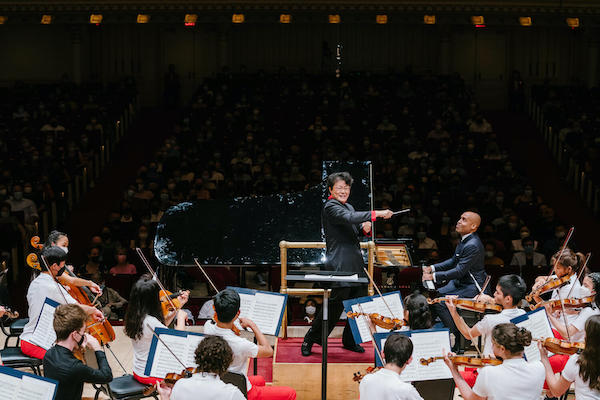Chen leads NYO2 with rousing energy at Carnegie Hall

The concert by NYO2 Monday night at Carnegie Hall brought to a close the 2022 edition of Carnegie’s summer orchestral training program. Made up of young musicians from across the USA aged 14-17, NYO2 was finally back performing live before an audience, this time with Mei-Ann Chen conducting. (She led streaming performances with the same ensemble in 2021.)
Boundless energy is synonymous with almost any youth orchestra, but this one had it in spades. A handful of Fellows from the New World Symphony, America’s Orchestral Academy, supplemented its ranks, but it was NYO2’s show.
Youthful enthusiasm apart, much of the concert’s success and appeal was due to Chen’s magnetic presence on the podium as much as the programming. The three works—Jessie Montgomery’s Soul Force, George Gershwin’s Concerto in F, and Sergei Rachmaninoff’s Symphonic Dances—provided ample opportunity for entire sections to shine and soloists to strut their stuff. It was not only a laudable educational project, but highly enjoyable and a lot of fun.
It’s one thing to program works like the Gershwin and Rachmaninoff, but audition tapes alone can’t provide certainty that performers thus young could master the countless solos in them. No concerns there, however, as these teenagers had the technical mastery, musicianship and panache to rival anyone.
Montgomery is one of a cadre of young women composers whose music is resounding across America. Born and raised on New York’s Lower East Side, her style is in part the product of the cultural and political environment in which she was raised, and blends the classical with elements of vernacular music, improvisation, poetry, and social consciousness.
Composed in 2015, Soul Force was commissioned by “The Dream Unfinished,” a benefit for civil rights. In this one-movement work, Montgomery sought to portray a voice that struggles to be heard beyond the shackles of oppression, which was inspired by a line in Dr. Martin Luther King’s “I Have a Dream” speech — “We must not allow our creative protest to degenerate into physical violence. Again and again, we must rise to the majestic heights of meeting physical force with soul force.”
It was an ideal work, with which to open the concert. Montgomery’s Soul Force began with furtive, haltering bursts from the percussion, swelling to a joyous, triumphant clamor. and ended with the snap of the snare drum. For all of its rhythmic vitality, there are also moments of pure lyrical beauty. Chen provided crystal-clear direction and imposed an emotional arc on the work, both of which the young musicians made their own.
Gershwin’s jazz-infused music was dismissed by purists at both ends of the spectrum during his lifetime. Now Gershwin’s music seems a perfect fit for Carnegie Hall and these musicians, especially with pianist Aaron Diehl performing the Concerto in F
Woodwinds, brass and percussion were on the page stylistically from the get go, but it took a while for the strings to get in the swing of things. They played Gershwin’s soaring melodies perfectly, but it sounded a bit measured and mechanical. After Diehl entered, they underwent a remarkable transformation and were soon playing with the same sense of freedom and expressivity as he brought to the music. Diehl was the perfect counterweight to Chen. Energy was structure were her domains, but style, elegance and sophistication were his best traits as the evening’s soloist.
Rachmaninoff looked to the past when he composed the Symphonic Dances, his last major work. Completed in 1940, he quotes some of his early pieces and incorporates Russian Orthodox chants, which had been of lifelong interest to him, in a dazzling display of melody and orchestral color.
Chen, who is Taiwanese-American, waded into geopolitical waters with the lightest of steps through the two encores which the orchestra performed. She introduced the first, An-un Huang’s “Saibei Dance” (from his Saibei Suite No. 2) by explaining that although Huang’s musical education was interrupted by the tumult of the Cultural Revolution,, the music he composed during that time that evokes a traditional harvest celebration and resounds with joy, not despair. Chen led an interpretation that was dizzying as a kaleidoscope of melody and color.
Bernstein’s Overture to Candide, which followed, required no introduction. Chen took it at a clip, with the individual sections of the orchestra standing whenever they were featured, and in the case of the strings rising and falling with the shape of the melodies which they played. If high spirits had held sway in the earlier works, it ran wild in the Bernstein.
In the midst of the applause that ensured, Chen turned to the orchestra, not to begin another encore, but to cue them to join her in shouting “Thank you Carnegie Hall!” A sentiment shared by all present.